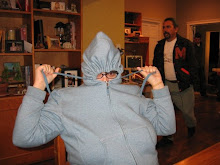In my pursuit of reading the Pulitzers, I purchased this gorgeous copy of T.S. Stribling's 1933 winner, The Store. I'm sure I spent quite a bit of money on it - it's leather-bound, gilt-edged, and has a ribbon bookmark - I'll be adding it to my permanent collection.
This book, the second in Stribling's trilogy, follows the further adventures of the Vaiden family, focusing specifically on Miltiades Vaiden. It is now post-Reconstruction in Florence, Alabama. Milt hasn't made much of himself since his days as a Civil War hero and local leader of the Ku Klux Klan. Milt is still rankled by what he perceived as a local store owner's "theft" of cotton from the family, and he sets out to get the family's rightful property (or the money owed them therefrom) back from the store owner, J. Handback.
Where Stribling really excels in this book, as he did in his last, is in the close examination of race relations in the post-Reconstruction South. With the recent events in Ferguson, Missouri, it was clear to me that we haven't come that far since the late 1800's - certainly not as far as we should have. White landowners in the South are struggling with how to deal with former slaves who now have rights. Milt Vaiden embodies the lost soul of the white Southerner who has been thrust into an existence that he is neither prepared nor happy for. Once a Civil War hero, a successful overseer, and leader of the KKK, in the New South, Milt Vaiden doesn't know what to do with himself. The book explores the lives of former slaves as they, too, seek to learn how to make do in a land where they no longer have the protection of their former owners, but do not quite have a fully independent existence, due to how they are seen and treated by most whites in the South. The book also explores the lives of those biracial products of rape and/or consensual relations between (usually) white male slave owners and their former slaves, particularly through the person of Toussaint Vaiden. How is a man who is neither white nor black to make his way in the world after the Civil War? Where does he belong, and how does he fit into the self-segregated society that is blossoming after Reconstruction?
As in the last novel, there are many uses of derogatory names for former slaves. The casual way the n-word is used is by far the most disturbing part of the novel, although I'm sure it was par for the course in that time and place (and may still be in some places). There were no rapes in this novel, but ***SPOILER ALERT*** there is a lynching at the very end. Not recommended for those who would be overly offended by these issues.
I give this book five out of five Whatevers. I see why it won the Pulitzer. There is so much about it to admire - the way Stribling strips down race relations after the War and really tries to present both sides of the issue; the slight tinge of spiritualism that invades the book; the examination of love, and the many ways in which one can love another person. I couldn't put it down over the Thanksgiving break, and I'm very glad I read it. I would not say that I liked Milt Vaiden, as a character...he was somewhat of a scalawag. But there were other characters I loved (including Gracie, former slave of the Vaiden family, and Lucy, the educated black woman who tries to teach the neighborhood's black children and eventually marries Toussaint). Highly recommended for an interesting look at the Old South as it became the New South, and for a look at race relations that might just be needed in today's society, as well.
2014-11
Saturday, November 29, 2014
Subscribe to:
Post Comments (Atom)





No comments:
Post a Comment